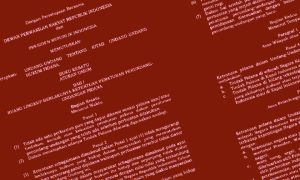Why is it that in the past few years Indonesia’s democratic scores have fallen while public satisfaction with government performance remains high?
Based on the Economist’s Democracy Index Report for 2022, Indonesia received the same score as in 2021, at 6.71 points out of 10, but its ranking fell from 52 to 54 out of a total of 167 countries. Similarly, from the data produced by Freedom House, Indonesia’s democratic score fell from 65 in 2017 to 59 in 2022.
Indeed, Indonesia’s deteriorating democratic fundamentals has given rise to a scholarly consensus about “democratic regression” and the general tightening of the democratic space in the Jokowi era.
But surveys of public opinion suggest that Indonesians do not share this deepening pessimism: instead, they demonstrate that there is consistent support for Jokowi’s government. The ISEAS Indonesian National Survey Project conducted in September 2022 highlighted that public satisfaction with the president increased marginally from 68% in the 2017 version to 71.8% in 2022. Another Kompas survey conducted from 25 January to 4 February 2023 also noted that general satisfaction with the current government stood at 69.3%, a marked increase from a similar survey conducted at the start of Jokowi’s second term (58.8%).
More broadly, Indonesians are strongly attached to democracy. Data from a 2022 Indikator survey indicates that 3 in 4 Indonesians believe that democracy is “the best system for Indonesia, even though it is not perfect”. This percentage has risen steadily since Indikator first posed this question to respondents in June 2012 (55.6%). There has therefore been a steady consolidation of public trust in democracy in the last 10 years. What accounts for the disparity between declining democratic scores and increased satisfaction with government performance?
Different conceptions of democracy
I would argue that the main reason why deteriorating democratic fundamentals as measured by international rating agencies are not reflected in the average Indonesian’s evaluation of government performance simply reflect the fact that the international ratings are tracking one conception of democracy, while domestic survey agencies are tracking another.
During the reform era—roughly from 1998 right up to the early 2010s—liberal reformers sought to build a system of checks of balances and expand civil liberties.
Indonesia and North Korea: warm memories of the Cold War
Friendly ties to Pyongyang have been an emblem of non-alignment for generations of Indonesian foreign policy makers.
For a time, enough members of the political elite shared this vision with liberal civil society.
But this conception of democracy as a system of checks and balances appears to have fallen by the wayside in Indonesia: civil society figures I have spoken to now characterise the DPR as “paralysed” (lumpuh), unable to provide a check-and-balance role with respect to the executive.
Instead another conception of democracy that has emerged to replace the reform-era vision is that of an electoral democracy with an instrumentalist and performative logic. In this conception of democracy, democracy’s success is measured not by the robustness of its checks and balances but by its ability to deliver on concrete policy outcomes.
Using data from the 2016 Asian Barometer survey, Eve Warburton and Edward Aspinall have showed that Indonesian survey respondents tend to associate democracy with good governance and socioeconomic outcomes. When asked to choose between democracy and economic development, only 7% of Indonesians said that democracy is more important.
This explains the disconnect between the democratic scores produced by international rating agencies and the surveys of public satisfaction with government performance produced by domestic survey agencies. As most Indonesians do not define democracy in liberal terms but in instrumentalist terms, they report increased satisfaction with government performance, especially due to the current administration’s track record in infrastructure development and its social welfare initiatives.
Elites in power are also coalescing around the second vision of democracy. Both Jokowi and Prabowo Subianto, the two presidential candidates in the 2014 and 2019 elections, have espoused the instrumental logic of democracy at different points. Jokowi has previously argued that politicians and political parties must show “proof” that democracy improves the people’s welfare. Similarly, in his speech to CSIS in August 2021, Prabowo highlighted that the crucial test for any political system or ideology is its ability to provide a better life for the people.
Two conceptions of democracy and their implications
What are the concrete implications of growing elite confidence in this instrumental conception of democracy for how Indonesian democracy functions?
One is a steady weakening of the horizontal accountability mechanisms introduced in the early reform era to limit executive power. This is most apparent in the relationship between the executive and the legislature in the past few years. As President Jokowi consolidated his legislative coalition from 2016 onwards, the relationship between the executive and the parliament has overwhelmingly shifted to coordination and cooperation. As explained by one parliamentarian I spoke to, checks and balances are important, but policy implementation is equally important as part of the government coalition.
Indeed, the key institutional feature that has been tweaked to favour cooperation between the two branches is the 2018 amendment to the Law on Legislative Institutions (UU MD3) which automatically appoints the party with the most seats in parliament as the speaker of the DPR. With PDI-P cadres occupying both the speakership and the presidency after the 2019 elections, this has facilitated the melding of the two branches in a way more akin to a parliamentary system of government. Due to the strong intra-elite accord and Jokowi’s successful coalition management, what civil society actors perceive as the parliament’s abdication of its check-and-balance role actually reflects the shift to an instrumental model whereby parliament delegates power to the executive for the sake of expedient governance. This approach has been embodied in the increased delegation of regulatory authority from the parliament to the central government with virtually no parliamentary oversight built in (for instance, in the design of the New Capital Authority).
At the same time, other reform era checking institutions have been allowed to weaken under this intra-elite compact. The Corruption Eradication Commission (KPK) was weakened in 2019 with the abolition of its independent status and the imposition of a supervisory board to give the executive branch more influence over its operations. The independence of the Constitutional Court has recently been called into question, as one of the justices on the Court was unceremoniously removed from office for annulling legislation supported by the DPR.
These developments in Indonesia might seem point to the emergence in Indonesia of what political scientist Guillermo O’Donnell called “delegative democracy”—a system of government that relies on competitive elections to select presidents but in which the winner has virtually unconstrained executive power. Indonesia is not a delegative democracy: the president does not have uncontested power, and the basic structure of the constitutional design put in place by liberal reformers remains in place. Furthermore, elite self-interest continues to constrain presidential power. Efforts by President Jokowi’s supporters to push through a third presidential term, for instance, have floundered due to strong opposition from other elites.
Democracy has nonetheless developed a strong instrumental logic in Indonesia, with elites safeguarding elections and presidential term limits not because of a belief in democratic principles, but because they are convenient rules of the game to structure elite competition and prevent potentially destabilising elite splits. The reform-era vision of Indonesian democracy has given way to an instrumental electoral democracy in which vertical accountability mechanisms—elections—remain robust but horizontal accountability mechanisms have atrophied.
For better or worse this instrumental version of democracy also offers a system of government that is probably more effective in delivering policy outcomes for the average Indonesian. By temporarily fusing executive and legislative power in a manner more akin to parliamentary regimes (though there is of course no guarantee that the Speaker of the DPR and the president will be from the same party after the 2024 elections) the central government can move faster and more effectively in its priority areas.
For now, this configuration has enabled the government to enact legislation and make progress on many of the urgent problems in the country, such as poverty alleviation, agrarian reform, job creation, and the building of new infrastructure. However, the current administration’s “move fast” economic model have also sometimes generated more economic inequality: witness, for instance, as nickel processing activities in North Maluku have yet to translate into concrete benefits for locals.
But is the shift away from a liberal-democratic model a good development for Indonesia? With weakened horizontal accountability mechanisms, Indonesia is a more brittle democracy that is reliant on future voters being able to pick a competent and well-intentioned president. There is very little that voters can do if a future president obtains the support of the political elite and decides to unilaterally exercise executive power in ways that conflict with popular preferences.
Conclusion: ‘kinerja’ politics?
The Jokowi administration has been a watershed in making policy performance and successes a key legitimising principle for democratic government in Indonesia. Instead of competing to show who are better democrats, candidates must compete to burnish their track records and demonstrate their ability to improve the lives of ordinary Indonesians.
Indonesia continues to be beset by pressing domestic economic challenges, including the question of how to secure good quality employment for the large youth population, improve the quality of education and healthcare, and address longstanding socioeconomic issues related to social mobility and poverty alleviation. Therefore, the candidate who is best able to demonstrate their effectiveness in terms of their track record, and best able to articulate a compelling economic agenda, is likely to have an edge.
Electoral competition based on policy outcomes is a positive development for Indonesian citizens. Once in power, the nature of Indonesia’s increasingly “parliamentary” system requires the president to shed their populist garb to make pragmatic political deals with the other elites, necessitating both accommodation and compromise. This could lead to further democratic erosion, but like what President Jokowi did this allows future presidents to focus on economic development programmes that benefit their voters.
It is why I believe that Indonesia is steadily moving towards a new political era—one of kinerja (performance) politics—that takes as its reference point not democratic reform, but democratic legitimacy based on competitive elections anchored in an instrumental and performative logic.
 Facebook
Facebook  Twitter
Twitter  Soundcloud
Soundcloud  Youtube
Youtube  Rss
Rss 



